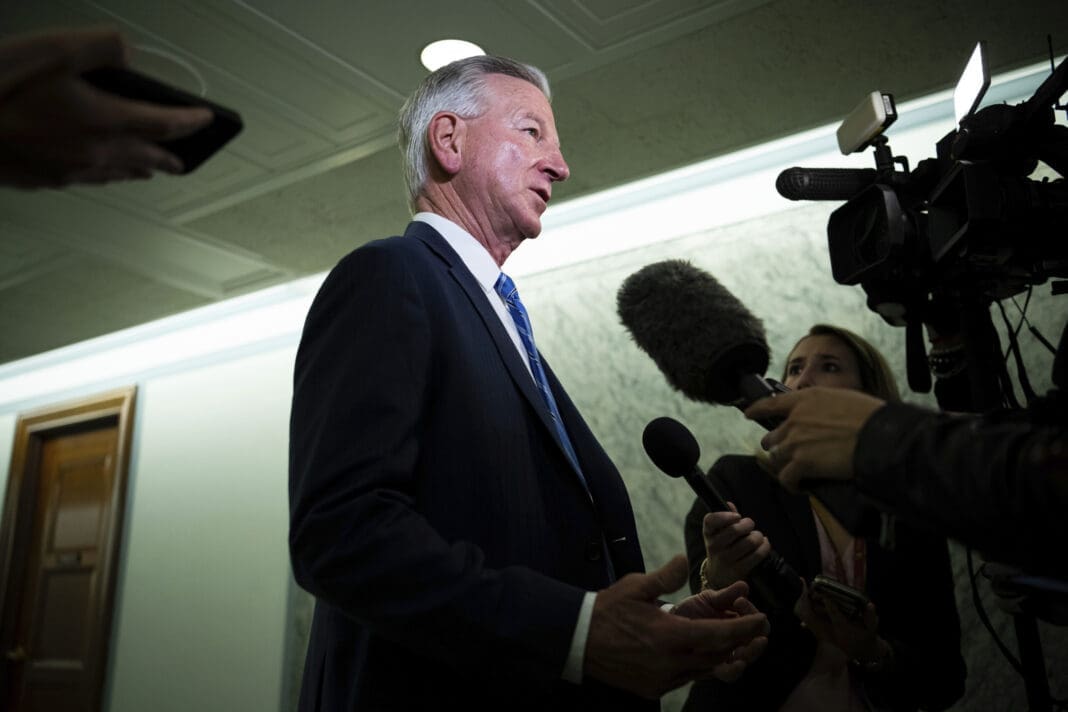GOP senator stalls military confirmations to challenge Pentagon's abortion protections
Sen. Tommy Tuberville has vowed to continue preventing the confirmation of military appointments unless the Department of Defense stops protecting legal abortion access for service members.

Thanks to one conservative Republican senator, the promotions and confirmations of hundreds of those serving in the armed forces are being delayed until the Department of Defense stops providing abortion care to service members, which, the Military Times reports, it has not shown any inkling of doing.
Alabama Sen. Tommy Tuberville, a Senate Armed Services Committee member, has pledged to block all pending confirmations of promotions by the Defense Department until recent policies on abortion are altered or repealed.
“I’m holding the DoD nominations because the secretary of defense is trying to push through a massive expansion of taxpayer-subsidized abortions without going through this body, without going through Congress,” Tuberville claimed on the Senate floor on March 8.
Following the Supreme Court ruling in Dobbs v. Jackson Women’s Health Organization in June that overturned Roe v. Wade, the Defense Department began planning what it would do in states with restrictive abortion laws, where about 80,000 active duty service members who could become pregnant are stationed. According to an article published on the department’s official website, women are the military’s fastest-growing demographic and comprise about 17% of those serving in the armed forces.
Federal law does not allow abortion care at military treatment facilities except in cases where a pregnant person’s life is at risk or when the pregnancy is the result of rape or incest.
In mid-February, the department announced several new policies that would ensure that service members can receive reproductive health care.
Policies include fully paid travel expenses for those who must leave a state for abortion care or fertility treatments, along with three weeks of leave and the right to have either a spouse or a partner accompany them. Additionally, service members are allowed up to 20 weeks to notify command authorities of their pregnancy.
“Our Service members and their families do not control where they are stationed, and due to the nature of military service, are frequently required to travel or move to meet operational requirements,” the department said in its announcement memo. “The efforts taken by the Department today will not only ensure that Service members and their families are afforded time and flexibility to make private health care decisions, but will also ensure Service members are able to access non-covered reproductive health care regardless of where they are stationed.”
Tuberville has called the Defense Department’s policies equivalent to an “abortion travel agency,” saying that he would continue to object to nominees until the department reverses course on them. As of last week, at least 150 flag and general officer promotions as well as civilian leadership positions have been held up by Tuberville.
Saying that he respected Tuberville’s position on the issue, Colorado Democratic Sen. Michael Bennet responded, “What I don’t respect is the idea that we can’t move past this blanket hold on every single flag officer that’s up for promotion just because the senator doesn’t agree with the majority position [on abortion] that is reflected in the Department of Defense’s modest rules.”
Bennet argued that the policies are a necessity to continue recruiting and retaining female service members.
A September 2022 Rand Corporation report on the impacts of the Dobbs decision on national security, cited by Bennet, noted: “For the past several years, the military services have been deliberately recruiting women, both to fulfill specialized positions and discrete operational needs and because they represent a higher percentage of the recruitable population than their male counterparts. … Service women are already more likely to leave service than their male peers. … Frustration with family planning in the context of a military career and gender bias and discrimination often are cited as reasons for their separation.”
Kyleanne Hunter, a former Marine Corps pilot and a political scientist at the Rand Corporation, wrote last June, before the decision in Dobbs was published, “Even before the draft Supreme Court opinion became public, service women were discussing how their lack of choice of duty location exacerbated many of the barriers to abortion care.”
The Hill reported Monday that a group of 38 Democratic lawmakers led by Sen. Jeanne Shaheen of New Hampshire had sent a letter to Secretary of Defense Lloyd J. Austin advising him, “[W]ith a pending federal lawsuit threatening theFood and Drug Administration’s approval of mifepristone, one of two medications most commonly used in medication abortion, it is imperative that the Department of Defense continue to take action to protect the rights of service members and their families to access abortion care.”
The letter notes: “State laws restricting or prohibiting our service members from accessing reproductive care send a message that the United States does not trust those who serve in uniform – whom we trust to protect our country – to make their own decisions about their health care and families. These laws also jeopardize the health and overall readiness of our military.”
On Tuesday, Austin and Joint Chiefs of Staff Chair Gen. Mark Milley will appear before the Senate Armed Services Committee to discuss the 2024 budget, Military Times reports. As a member of the committee, Tuberville will be there to question them.
In a memo released in October, Austin said: “Our greatest strength is our people. There is no higher priority than taking care of our people, and ensuring their health and well-being. The Department of Defense will continue to closely evaluate our policies to ensure that we continue to provide seamless access to reproductive health care as appropriate and consistent with federal law.”
Published with permission of The American Independent Foundation.
Recommended

Fate of ‘game changer’ women’s health care bill in hands of Missouri Senate
A bill that would improve health care access for Missouri women almost died in the House after some lawmakers conflated birth control legislation with abortion medication
By Anna Spoerre, Missouri Independent - May 08, 2024
Trump leaves door open to banning medication abortion nationwide
Donald Trump is planning to release more details in the weeks ahead about how his administration would regulate access to medication abortion, according to comments he made during a lengthy interview with Time magazine published Tuesday.
By Jennifer Shutt, States Newsroom - April 30, 2024
Ohio doctors fear effects of emergency abortion care case set to go before U.S. Supreme Court
A federal law that allows emergency departments to treat patients without regard to their ability to pay will be under U.S. Supreme Court scrutiny this week, and Ohio doctors are concerned about the case’s local impact on emergency abortion care.
By Susan Tebben, Ohio Capital Journal - April 23, 2024







































































